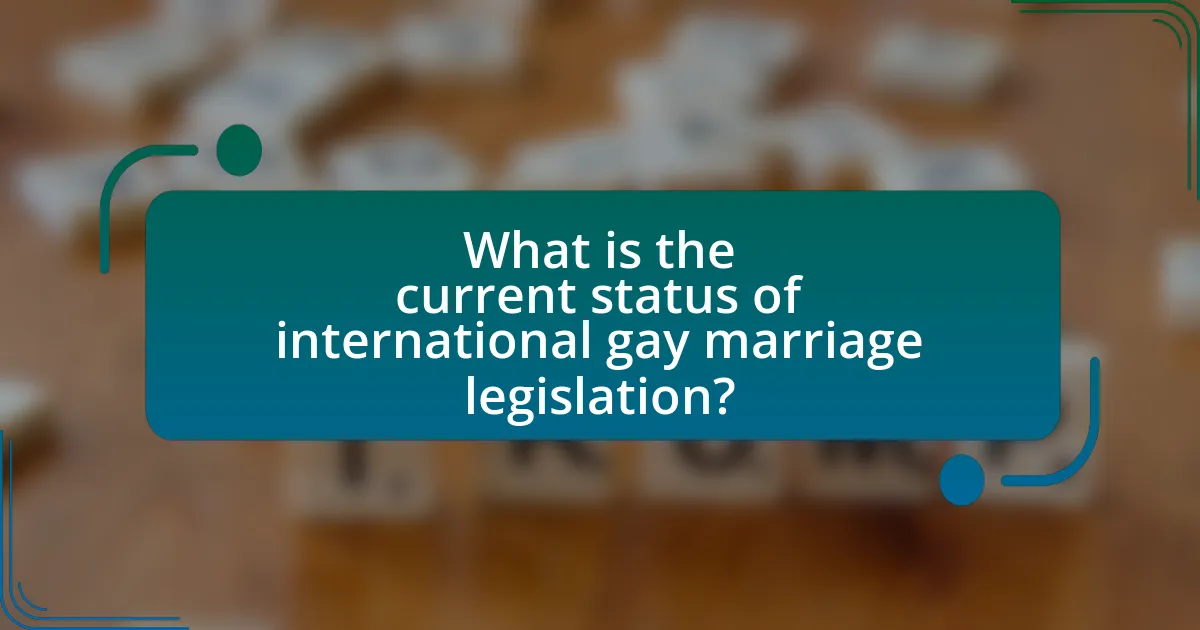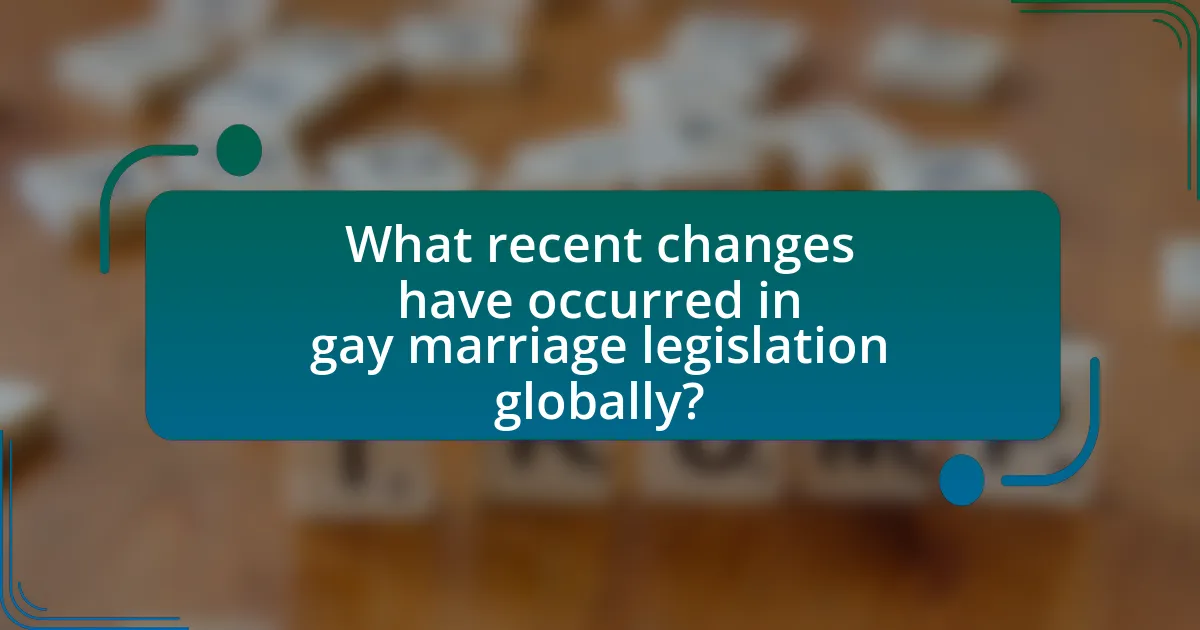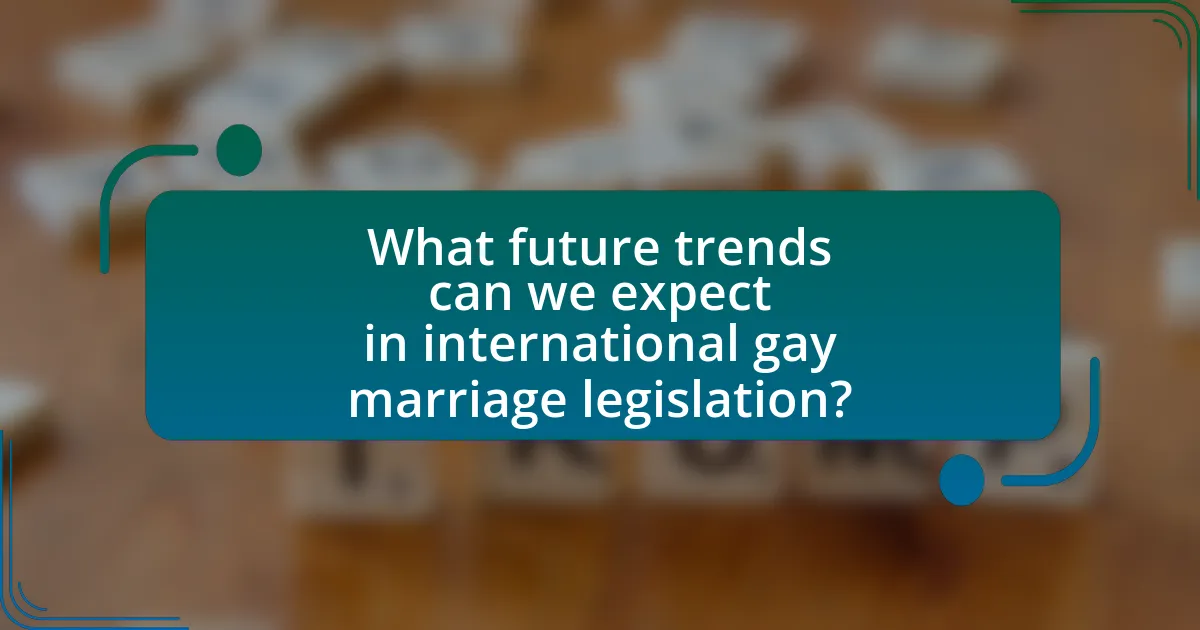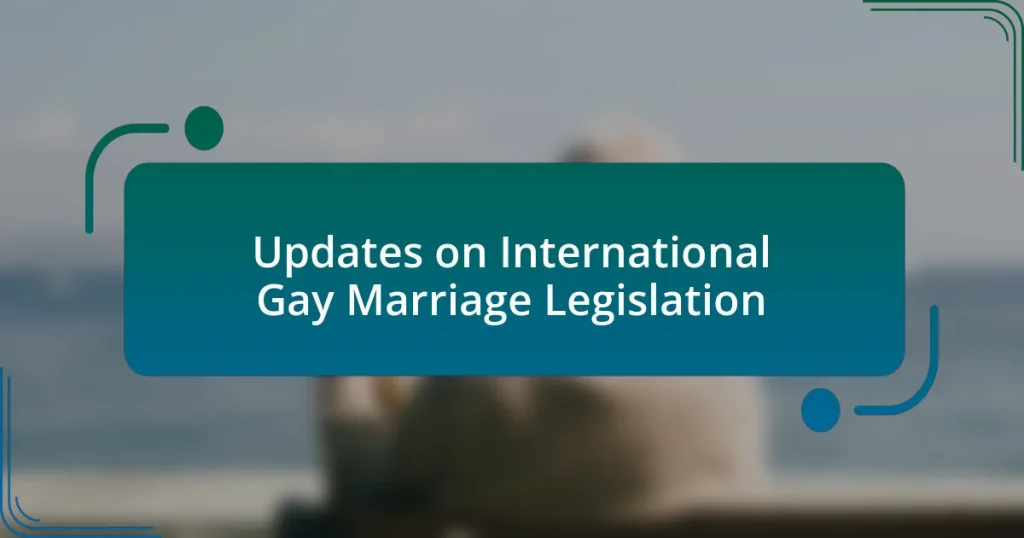The article provides an overview of the current status of international gay marriage legislation as of October 2023, highlighting that 34 countries have legalized same-sex marriage while many others, particularly in Africa and the Middle East, continue to criminalize same-sex relationships. It discusses the varying approaches to gay marriage legislation across different countries, key milestones in legalization, and the influence of cultural attitudes on legal frameworks. Additionally, the article examines the legal implications for same-sex couples, recent changes in legislation, ongoing debates surrounding marriage equality, and the role of public opinion and advocacy in shaping future trends in gay marriage laws globally.

What is the current status of international gay marriage legislation?
As of October 2023, international gay marriage legislation varies significantly across countries. Currently, 34 countries have legalized same-sex marriage, including nations like the United States, Canada, and most of Western Europe. In contrast, many countries, particularly in Africa and the Middle East, maintain laws that criminalize same-sex relationships, with no legal recognition of gay marriage. For instance, countries such as Saudi Arabia and Uganda impose severe penalties for homosexuality, reflecting a stark divide in global attitudes toward LGBTQ+ rights. This disparity highlights ongoing debates and movements advocating for marriage equality in regions where it remains unrecognized.
How have different countries approached gay marriage legislation?
Different countries have approached gay marriage legislation in various ways, reflecting diverse cultural, legal, and political contexts. For instance, countries like the Netherlands and Belgium were pioneers, legalizing same-sex marriage in 2001 and 2003, respectively, setting a precedent for others. In contrast, nations such as the United States initially had a patchwork of state laws until the Supreme Court’s 2015 ruling in Obergefell v. Hodges established same-sex marriage as a constitutional right nationwide. Meanwhile, countries like Germany and Australia legalized gay marriage in 2017 and 2018, respectively, after extensive public debate and legislative processes. Conversely, some countries, particularly in regions like the Middle East and parts of Africa, maintain strict prohibitions against same-sex marriage, often influenced by religious and cultural norms. This global landscape illustrates the varying degrees of acceptance and legal recognition of same-sex unions.
What are the key milestones in the legalization of gay marriage worldwide?
The key milestones in the legalization of gay marriage worldwide include several landmark events. In 2001, the Netherlands became the first country to legalize same-sex marriage, setting a precedent for others. In 2003, the Massachusetts Supreme Judicial Court ruled in favor of same-sex marriage, making it the first U.S. state to do so. In 2015, the U.S. Supreme Court’s decision in Obergefell v. Hodges legalized same-sex marriage nationwide, marking a significant victory for LGBTQ+ rights in the United States. Additionally, in 2017, Germany legalized same-sex marriage, reflecting a growing acceptance in Europe. By 2023, over 30 countries had legalized same-sex marriage, demonstrating a global trend towards equality. These milestones illustrate the progressive shift in societal attitudes and legal frameworks regarding same-sex marriage.
How do cultural attitudes influence gay marriage laws in various regions?
Cultural attitudes significantly influence gay marriage laws across various regions by shaping public opinion, political agendas, and legal frameworks. In regions where cultural norms are more accepting of LGBTQ+ rights, such as Western Europe and parts of North America, laws tend to favor the legalization of gay marriage, as seen in countries like the Netherlands, which was the first to legalize it in 2001. Conversely, in regions with conservative cultural attitudes, such as many parts of Africa and the Middle East, laws often reflect opposition to gay marriage, with countries like Uganda and Saudi Arabia enforcing strict penalties against homosexuality. This correlation between cultural attitudes and legal outcomes is supported by studies indicating that societies with higher levels of acceptance of LGBTQ+ individuals are more likely to enact progressive marriage laws, as evidenced by the Pew Research Center’s findings on global attitudes toward homosexuality.
What are the legal implications of gay marriage in different jurisdictions?
The legal implications of gay marriage vary significantly across different jurisdictions. In countries where gay marriage is legal, such as the United States, Canada, and many European nations, same-sex couples enjoy the same legal rights and responsibilities as heterosexual couples, including tax benefits, inheritance rights, and parental rights. Conversely, in jurisdictions where gay marriage is not recognized, such as many parts of Africa and the Middle East, same-sex relationships may face criminalization, leading to legal penalties and social discrimination. For example, in countries like Saudi Arabia and Uganda, same-sex relationships can result in severe legal consequences, including imprisonment or harsher penalties. This disparity highlights the ongoing global debate regarding LGBTQ+ rights and the legal recognition of same-sex unions.
How does gay marriage legislation affect rights and benefits for couples?
Gay marriage legislation significantly enhances rights and benefits for couples by granting them legal recognition and access to the same privileges as heterosexual couples. This includes rights related to taxation, inheritance, healthcare decisions, and adoption. For instance, following the legalization of same-sex marriage in the United States in 2015, same-sex couples gained access to over 1,000 federal benefits previously unavailable to them, such as spousal Social Security benefits and tax filing options. Additionally, studies show that legal recognition of same-sex marriage correlates with improved mental health outcomes for LGBTQ+ individuals, highlighting the broader societal benefits of such legislation.
What challenges do same-sex couples face in countries where gay marriage is not recognized?
Same-sex couples in countries where gay marriage is not recognized face significant legal and social challenges. These challenges include the lack of legal recognition for their relationships, which can lead to difficulties in areas such as inheritance rights, tax benefits, and access to healthcare decisions. For instance, without legal marriage, a partner may not have the right to make medical decisions for their significant other in emergencies. Additionally, same-sex couples often encounter discrimination and social stigma, which can affect their mental health and overall well-being. According to a 2020 report by ILGA (International Lesbian, Gay, Bisexual, Trans and Intersex Association), over 70 countries still criminalize same-sex relationships, further exacerbating the challenges faced by these couples.

What recent changes have occurred in gay marriage legislation globally?
Recent changes in gay marriage legislation globally include the legalization of same-sex marriage in several countries, such as Mexico, where the Supreme Court ruled in 2022 that same-sex marriage is a constitutional right, leading to its legalization in all states. Additionally, in 2023, the United States Congress passed the Respect for Marriage Act, which protects same-sex marriage at the federal level, ensuring that states cannot deny recognition of such marriages. These developments reflect a growing trend towards the acceptance and legalization of same-sex marriage worldwide, with over 30 countries now recognizing it legally.
Which countries have recently legalized gay marriage?
As of 2023, countries that have recently legalized gay marriage include Mexico, where the Supreme Court ruled in favor of same-sex marriage in June 2022, and Ecuador, which legalized it in July 2021 following a Constitutional Court ruling. These legalizations reflect a growing trend towards marriage equality in various regions.
What were the driving factors behind these recent legalizations?
The driving factors behind recent legalizations of gay marriage include evolving societal attitudes, legal advocacy, and political support. Societal attitudes have shifted significantly, with increasing acceptance of LGBTQ+ rights reflected in public opinion polls; for instance, a 2021 Gallup poll indicated that 70% of Americans support same-sex marriage. Legal advocacy has played a crucial role, as organizations like the Human Rights Campaign have pushed for legislative changes and court rulings that recognize marriage equality. Additionally, political support from leaders and parties has facilitated these changes, with several countries enacting laws that align with international human rights standards, further promoting equality and non-discrimination.
How have public opinions shifted in these countries regarding gay marriage?
Public opinions regarding gay marriage have generally shifted towards greater acceptance in many countries. For instance, in the United States, support for same-sex marriage rose from 27% in 1996 to 70% in 2021, according to a Gallup poll. Similarly, in countries like Germany and Australia, public support increased significantly, with Germany’s approval rising from 49% in 2015 to 75% in 2021, and Australia’s support climbing from 38% in 2015 to 74% in 2021, as reported by the Australian Bureau of Statistics. These shifts reflect broader societal changes and increased visibility of LGBTQ+ rights, leading to more favorable attitudes towards gay marriage across various demographics.
What are the ongoing debates surrounding gay marriage legislation?
Ongoing debates surrounding gay marriage legislation primarily focus on issues of legal recognition, religious freedom, and societal acceptance. Legal recognition debates often center on whether same-sex marriages should be afforded the same rights and benefits as heterosexual marriages, with arguments citing the importance of equality under the law as established by landmark rulings such as Obergefell v. Hodges in the United States, which legalized same-sex marriage nationwide in 2015.
Religious freedom debates arise as some religious organizations argue that legalizing gay marriage infringes on their beliefs and practices, leading to discussions about the balance between civil rights and religious liberties. Additionally, societal acceptance remains a contentious issue, with varying public opinions influencing legislative actions in different countries. For instance, a 2021 Pew Research Center survey indicated that acceptance of same-sex marriage varies significantly across regions, impacting the legislative landscape.
These debates continue to evolve as new legal challenges and societal attitudes emerge, reflecting the complex interplay between law, religion, and public opinion in the context of gay marriage legislation.
What arguments do opponents of gay marriage present?
Opponents of gay marriage argue that it undermines traditional family structures, which they believe are essential for societal stability. They often claim that marriage should be exclusively between a man and a woman, citing historical and religious precedents as justification. Additionally, some opponents express concerns that legalizing gay marriage could lead to the erosion of religious freedoms, as they fear that religious institutions may be compelled to perform same-sex marriages against their beliefs. Furthermore, they argue that children do best when raised by a mother and father, suggesting that same-sex couples may not provide the same environment for child-rearing. These arguments are often supported by various studies and surveys reflecting public opinion on marriage and family dynamics.
How do proponents counter these arguments in the legislative process?
Proponents counter arguments against gay marriage legislation by emphasizing the principles of equality and human rights. They argue that denying same-sex couples the right to marry constitutes discrimination, which violates constitutional guarantees of equal protection under the law. For instance, in the United States, the Supreme Court’s decision in Obergefell v. Hodges (2015) established that same-sex marriage is a constitutional right, reinforcing the argument that legal recognition of such unions is essential for ensuring equal treatment. Additionally, proponents often cite public support for gay marriage, which has increased significantly over the years, indicating a societal shift towards acceptance and the need for legislative alignment with contemporary values.

What future trends can we expect in international gay marriage legislation?
Future trends in international gay marriage legislation indicate a growing acceptance and legalization of same-sex marriage across various countries. As of 2023, over 30 countries have legalized same-sex marriage, reflecting a significant shift in societal attitudes and legal frameworks. This trend is expected to continue, driven by increasing advocacy for LGBTQ+ rights, judicial rulings favoring marriage equality, and public support for same-sex marriage, which has reached over 70% in many Western nations. Additionally, countries that previously resisted legalization, such as those in Eastern Europe and parts of Asia, may begin to reconsider their stances due to international pressure and changing cultural norms.
How might international treaties influence gay marriage laws?
International treaties can significantly influence gay marriage laws by establishing legal frameworks that promote human rights and equality. For instance, treaties like the International Covenant on Civil and Political Rights obligate signatory countries to respect and ensure the rights of all individuals, including LGBTQ+ persons. This can lead to pressure on nations to align their domestic laws with international standards, potentially resulting in the legalization of gay marriage. Additionally, regional treaties, such as the European Convention on Human Rights, have been interpreted by courts to support the recognition of same-sex relationships, further encouraging member states to adopt similar laws.
What role do human rights organizations play in advocating for gay marriage?
Human rights organizations play a crucial role in advocating for gay marriage by promoting equality and legal recognition of same-sex relationships. These organizations engage in lobbying efforts, public awareness campaigns, and legal challenges to influence legislation and public opinion. For instance, groups like the Human Rights Campaign and Amnesty International have actively campaigned for marriage equality, providing research, legal support, and mobilizing grassroots activism. Their efforts have contributed to significant legal advancements, such as the U.S. Supreme Court ruling in Obergefell v. Hodges in 2015, which legalized same-sex marriage nationwide, demonstrating the impact of organized advocacy on policy change.
What strategies can advocates use to promote gay marriage legislation?
Advocates can promote gay marriage legislation through grassroots mobilization, public awareness campaigns, and strategic lobbying. Grassroots mobilization involves organizing community events and rallies to build support and demonstrate public backing for gay marriage. Public awareness campaigns utilize social media, advertisements, and educational programs to inform the public about the benefits of marriage equality, highlighting statistics such as the 2015 U.S. Supreme Court decision in Obergefell v. Hodges, which legalized same-sex marriage nationwide. Strategic lobbying includes engaging with lawmakers, providing them with research and data that show the positive social and economic impacts of legalizing gay marriage, such as increased tax revenue and improved mental health outcomes for LGBTQ+ individuals.
How can public awareness campaigns impact legislative changes?
Public awareness campaigns can significantly influence legislative changes by mobilizing public opinion and increasing visibility for specific issues. For instance, campaigns advocating for gay marriage have successfully shifted societal attitudes, leading to legislative reforms in various countries. A notable example is the Human Rights Campaign’s “Marriage Equality” initiative in the United States, which contributed to the Supreme Court’s 2015 decision in Obergefell v. Hodges, legalizing same-sex marriage nationwide. This demonstrates that sustained public engagement and awareness can create pressure on lawmakers to enact or amend legislation in favor of marginalized communities.
What best practices have proven effective in lobbying for gay marriage rights?
Effective lobbying for gay marriage rights has included grassroots mobilization, strategic coalition-building, and targeted messaging. Grassroots mobilization has empowered local communities to advocate for change, exemplified by organizations like the Human Rights Campaign, which engaged millions in campaigns. Strategic coalition-building with civil rights groups has broadened support, as seen in the collaboration between LGBTQ+ organizations and broader social justice movements. Targeted messaging that emphasizes love, family, and equality has resonated with the public, contributing to shifts in public opinion; for instance, a 2019 Gallup poll indicated that 70% of Americans supported same-sex marriage, reflecting the impact of effective advocacy.

